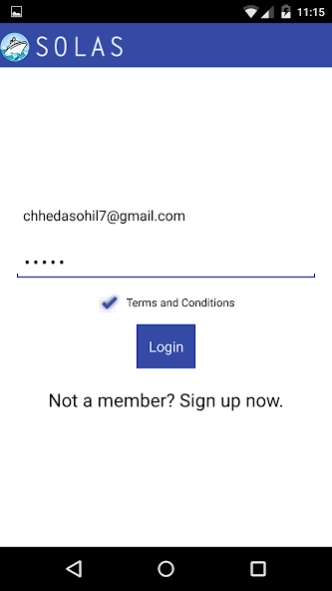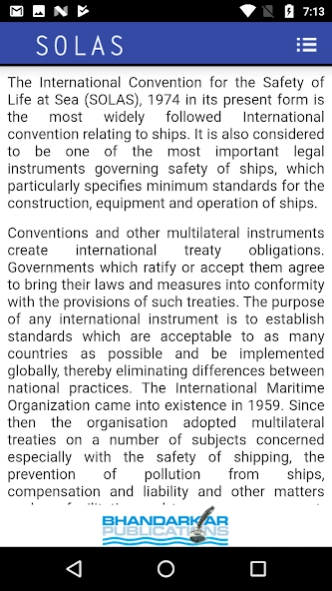SOLAS Consolidated 2018 1.8
Paid Version
Publisher Description
SOLAS Consolidated 2018 - This SOLAS App has been changed to one time payment uninterrupted use.
The International Convention for the Safety of Life at Sea (SOLAS), 1974 in its present form is the most widely followed International convention relating to ships. It is also considered to be one of the most important legal instruments governing safety of ships, which particularly specifies minimum standards for the construction, equipment and operation of ships.
This mobile app is inclusive of amendments upto 2017 ie. MSC.338(91), MSC.343(91), MSC.344(91), MSC.346(91), MSC.350(92), MSC.365(93), MSC.366(93), MSC.380(94), MSC.386(94), MSC.392(95), MSC.394(95), MSC.395(95).
Conventions and other multilateral instruments create international treaty obligations. Governments which ratify or accept them agree to bring their laws and measures into conformity with the provisions of such treaties. The purpose of any international instrument is to establish standards which are acceptable to as many countries as possible and be implemented globally, thereby eliminating differences between national practices. The International Maritime Organization came into existence in 1959. Since then the organisation adopted multilateral treaties on a number of subjects concerned especially with the safety of shipping, the prevention of pollution from ships, compensation and liability and other matters such as facilitation and tonnage measurement. Most of these are called conventions but a few are referred to as protocols or agreements. However, their legal status is the same. When a proposal is formally agreed a draft of the treaty is then prepared in one of the Organization’s principal committees or sub-committees. When the draft is approved by either the Maritime Safety Committee, the Marine Environment Protection Committee or the Legal Committee it is submitted to an International Diplomatic Conference to which all members of the United Nations and its specialised agencies are invited. With the successful adoption of the Convention, the onus for action moves to Governments. The speed with which the convention enters into force (that is, becomes binding on States which have agreed to be bound by it) depends upon the time taken by Governments to ratify or accept it. The consent to be bound may be expressed by signature, ratification, acceptance, approval or accession, depending on the wish of the States concerned. This procedure is generally referred to as "ratification". IMO treaties enter into force after a specific number of States have ratified them with a certain proportion of the world’s total tonnage. This ensures acceptance by majority of shipping interest. After the requirements for entry into force of a treaty have been achieved, there is a "period of grace" before it actually comes into force. This period varies from a few months to a year or even two years, and is designed to enable the Governments concerned to take the necessary legislative or administrative measures for implementing the provisions of the convention.
The main responsibility for the enforcement of an international treaty lies on the State under whose flag the ships concerned operate. Basically each Government is responsible for ensuring that ships which fly its flag conform to the requirements of treaties which it has ratified. However, recent IMO treaties also contain provisions requiring States, particularly port States, to enforce the requirements of the convention. This means that whether a ship flies the flag of a party to the convention or not it must comply with the requirements of a convention whenever it is calling in a port belonging to a party to the convention. International Organizations such as IMO have no authority or means to enforce or implement conventions. The Organization’s role is to encourage the Governments concerned to take the required measures. Where necessary, the Organization provides technical advice and assistance to Governments which may need such advice and assistance in taking the requisite action.
About SOLAS Consolidated 2018
SOLAS Consolidated 2018 is a paid app for Android published in the Teaching & Training Tools list of apps, part of Education.
The company that develops SOLAS Consolidated 2018 is Bhandarkar Publications. The latest version released by its developer is 1.8. This app was rated by 1 users of our site and has an average rating of 4.0.
To install SOLAS Consolidated 2018 on your Android device, just click the green Continue To App button above to start the installation process. The app is listed on our website since 2021-08-26 and was downloaded 41 times. We have already checked if the download link is safe, however for your own protection we recommend that you scan the downloaded app with your antivirus. Your antivirus may detect the SOLAS Consolidated 2018 as malware as malware if the download link to com.ort.solas2new is broken.
How to install SOLAS Consolidated 2018 on your Android device:
- Click on the Continue To App button on our website. This will redirect you to Google Play.
- Once the SOLAS Consolidated 2018 is shown in the Google Play listing of your Android device, you can start its download and installation. Tap on the Install button located below the search bar and to the right of the app icon.
- A pop-up window with the permissions required by SOLAS Consolidated 2018 will be shown. Click on Accept to continue the process.
- SOLAS Consolidated 2018 will be downloaded onto your device, displaying a progress. Once the download completes, the installation will start and you'll get a notification after the installation is finished.



